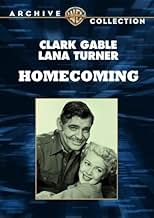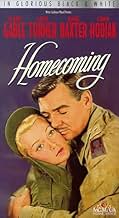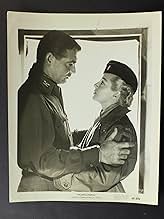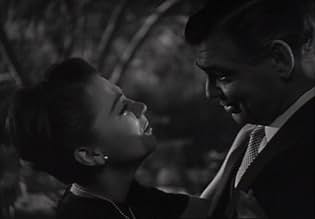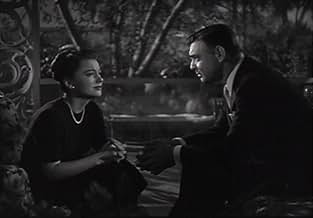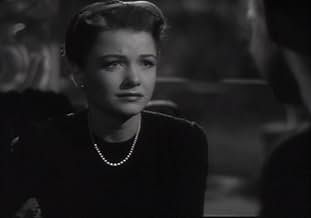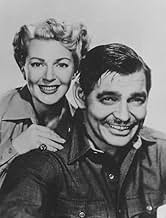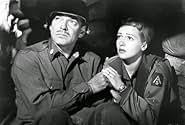AVALIAÇÃO DA IMDb
6,8/10
1,2 mil
SUA AVALIAÇÃO
Adicionar um enredo no seu idiomaAt the end of WW2, aboard a repatriation ship, an Army doctor reminisces about his war years while being interviewed by a reporter.At the end of WW2, aboard a repatriation ship, an Army doctor reminisces about his war years while being interviewed by a reporter.At the end of WW2, aboard a repatriation ship, an Army doctor reminisces about his war years while being interviewed by a reporter.
- Direção
- Roteiristas
- Artistas
- Prêmios
- 4 vitórias no total
Jessica Grayson
- Sarah, Johnson's Maid
- (as Jessie Grayson)
John Albright
- Corpsman
- (não creditado)
Frank Arnold
- Maitre d'Hotel
- (não creditado)
Peggy Badley
- Nurse Betty Simpson
- (não creditado)
Art Baker
- Williams, Reporter on Transport Ship
- (não creditado)
Gregg Barton
- Captain
- (não creditado)
Nanette Bordeaux
- Nurse
- (não creditado)
- Direção
- Roteiristas
- Elenco e equipe completos
- Produção, bilheteria e muito mais no IMDbPro
Avaliações em destaque
What a gem this story is! Here you will find no platitudes; no heroes 10 feet tall; no heels - most of all no heels. This is about the most caring, life-affirming story you are ever going to find, and it is done without any syrup, nor any gratuitous and tiresome acting-out of missteps.
There is a a single scene near the end which implies that a single misstep MAY have been committed, but sorry to tell you, you are going to have to work out for yourself what did or didn't happen, because it's not spelled out. It was brave rather than a cop-out to present a pivotal scene that way.
The film is technically excellent. The scene composition is superb. You have never seen a WW2 field hospital so meticulously and realistically re-created. There is a scene viewed through the door of a tent where someone walks away that is so amazingly technically well done (as well as evocative) as to be amazing. I can't tell you that the snow falling in that scene was real, but it LOOKED absolutely real. The fadeout as the figure walked gradually into the falling snow was perfect. It's a little thing that a film nut notices, because it's hard to do.
The messages are about finding one's humanity, daring to need, and daring to reach out to someone to need you back. By the end, you may find yourself touched so deeply as to be shaking.
There is a a single scene near the end which implies that a single misstep MAY have been committed, but sorry to tell you, you are going to have to work out for yourself what did or didn't happen, because it's not spelled out. It was brave rather than a cop-out to present a pivotal scene that way.
The film is technically excellent. The scene composition is superb. You have never seen a WW2 field hospital so meticulously and realistically re-created. There is a scene viewed through the door of a tent where someone walks away that is so amazingly technically well done (as well as evocative) as to be amazing. I can't tell you that the snow falling in that scene was real, but it LOOKED absolutely real. The fadeout as the figure walked gradually into the falling snow was perfect. It's a little thing that a film nut notices, because it's hard to do.
The messages are about finding one's humanity, daring to need, and daring to reach out to someone to need you back. By the end, you may find yourself touched so deeply as to be shaking.
Movies like this one are discoveries. Mervyn LeRoy was a director that always knew where to go for a good story and get amazing performances out of his actors. In this film he demonstrates how to create a movie that holds the viewer's attention. It is based on a story by Sidney Kingsley and was adapted by Jan Lustig.
The movie shows the American cinema at its best as it combines a look to WWII and a forbidden love, something that probably had a hard time passing the censor's scissors. Mr. LeRoy makes the picture highly engrossing because of the way he presents the story. Men and women, for the first time were in the front lines; the men as combatants, or in this case, a doctor and the women as nurses, or filling in for the jobs the men couldn't do because they did the fighting.
Clark Gable was an actor that made this picture the joy it is to watch by making us believe he is this surgeon, Dr. Lee Johnson, a man that awakes to reality when he has to deal first hand with treating the wounded soldiers. Mr. Gable casts such a virile shadow in his best work that we know where he stood all the time. His Dr. Johnson shows the strain of the stress of war, the loyalty to his wife at home and the sudden love he finds for "Snapshot" McCall. He remains throughout the film focused in helping the soldiers, until the passion he feels for his nurse, gets the best of him.
Lana Turner is the real surprise of the movie. She is playing a role that probably would not have been offered to her because of the heat and glamour she projected. Her nurse McCall is a woman that life has made a cynic because of the tragedy in her own life and the fact that she is separated from her young son. The magnetism between Ms. Turner and Mr. Gable is what keeps us interested in the movie. Lana Turner shows she had the potential for playing dramatic parts that were not offered to her; she was type-casted as the siren, or the sophisticate in most of her work, but she had the range and the potential that probably only Mr. LeRoy, who discovered Ms. Turner, saw she had. Only a director like Mr. LeRoy could elicit this performance from Ms. Turner.
Anne Baxter is the wife that stays home hoping her man will come back alive. Her Penny Johnson makes her appear as insecure because she perceives her husband's affection might lie with the nurse that he complains to her at the beginning of his correspondence. John Hodiak plays the friend, Dr. Sunday, a man who has his feet on the ground and believes he should help the poor people of his area, instead of the society types that Dr. Johnson attracts.
The movie is satisfying because is tells a good story with characters one is easily identified with. Mr. LeRoy was the one that got all the elements together and gave us this classic film that is timeless.
The movie shows the American cinema at its best as it combines a look to WWII and a forbidden love, something that probably had a hard time passing the censor's scissors. Mr. LeRoy makes the picture highly engrossing because of the way he presents the story. Men and women, for the first time were in the front lines; the men as combatants, or in this case, a doctor and the women as nurses, or filling in for the jobs the men couldn't do because they did the fighting.
Clark Gable was an actor that made this picture the joy it is to watch by making us believe he is this surgeon, Dr. Lee Johnson, a man that awakes to reality when he has to deal first hand with treating the wounded soldiers. Mr. Gable casts such a virile shadow in his best work that we know where he stood all the time. His Dr. Johnson shows the strain of the stress of war, the loyalty to his wife at home and the sudden love he finds for "Snapshot" McCall. He remains throughout the film focused in helping the soldiers, until the passion he feels for his nurse, gets the best of him.
Lana Turner is the real surprise of the movie. She is playing a role that probably would not have been offered to her because of the heat and glamour she projected. Her nurse McCall is a woman that life has made a cynic because of the tragedy in her own life and the fact that she is separated from her young son. The magnetism between Ms. Turner and Mr. Gable is what keeps us interested in the movie. Lana Turner shows she had the potential for playing dramatic parts that were not offered to her; she was type-casted as the siren, or the sophisticate in most of her work, but she had the range and the potential that probably only Mr. LeRoy, who discovered Ms. Turner, saw she had. Only a director like Mr. LeRoy could elicit this performance from Ms. Turner.
Anne Baxter is the wife that stays home hoping her man will come back alive. Her Penny Johnson makes her appear as insecure because she perceives her husband's affection might lie with the nurse that he complains to her at the beginning of his correspondence. John Hodiak plays the friend, Dr. Sunday, a man who has his feet on the ground and believes he should help the poor people of his area, instead of the society types that Dr. Johnson attracts.
The movie is satisfying because is tells a good story with characters one is easily identified with. Mr. LeRoy was the one that got all the elements together and gave us this classic film that is timeless.
Ulysses ,what a name for a major whose odyssey took place in WW2,who learned after his "voyage" that success is no success at all,that selfishness leads to nowhere and that a doctor's work is to help his fellow men;we are not far from Stahl's "magnificent obsession" in which a reckless playboy was told that a man (Jesus ) had given his life so man was saved .
It's strange that the world Ulysse lives in is full of altruistic persons ,from "Snapshot" the nurse who never has a rest till all the wounded soldiers are operated to the Chester doctor (Hodiak) whose war has begun long before WW2,and from "Monk" the unfortunate soldier to the good doctor Sunday (again,what a name!).The US army looks more like Salvation Army! The title is partly a misnomer because it's essentially a long flashback (actually several flashbacks) dealing with the hard life of a military medical team in the war.Thus Gable is torn between his faithful wife (Anne Baxter) and his courageous nurse (their relationship is much too predictable).Best scene is perhaps the "Roman " bath :we feel that Gable is very human when she takes her bath and he 's got to force himself to stay calm and not to have a little look !
It's strange that the world Ulysse lives in is full of altruistic persons ,from "Snapshot" the nurse who never has a rest till all the wounded soldiers are operated to the Chester doctor (Hodiak) whose war has begun long before WW2,and from "Monk" the unfortunate soldier to the good doctor Sunday (again,what a name!).The US army looks more like Salvation Army! The title is partly a misnomer because it's essentially a long flashback (actually several flashbacks) dealing with the hard life of a military medical team in the war.Thus Gable is torn between his faithful wife (Anne Baxter) and his courageous nurse (their relationship is much too predictable).Best scene is perhaps the "Roman " bath :we feel that Gable is very human when she takes her bath and he 's got to force himself to stay calm and not to have a little look !
Successful surgeon Ulysses Johnson (Clark Gable) joins the Army Medical Corps during WW2. Once deployed, he develops a tempestuous relationship with his chief nurse, Jane "Snapshot" McCall (Lana Turner). Their constant bickering eventually morphs into romantic feelings, which Johnson's wife Penny (Anne Baxter) can sense back home through his letters. She looks for solace from crusading doctor Robert Sunday (John Hodiak).
This somewhat soapy romance features surprisingly good performances from the cast. Gable seems an unlikely surgeon at first, but he settles into that role well. Baxter and Hodiak, a real-life married couple at the time, give their best to underwritten parts. The real revelation is Lana Turner, an actress that I've never really warmed to. I thought she fit her role well in The Postman Always Rings Twice, but every other movie that I've seen her in, I couldn't help thinking it would be better with someone else cast. Here she's real and genuine and nuanced like I haven't seen her before. It may be the script, or direction that clicked, or co-star Gable, or all of the above, but it works, and it's the best acting job I've seen from her.
This somewhat soapy romance features surprisingly good performances from the cast. Gable seems an unlikely surgeon at first, but he settles into that role well. Baxter and Hodiak, a real-life married couple at the time, give their best to underwritten parts. The real revelation is Lana Turner, an actress that I've never really warmed to. I thought she fit her role well in The Postman Always Rings Twice, but every other movie that I've seen her in, I couldn't help thinking it would be better with someone else cast. Here she's real and genuine and nuanced like I haven't seen her before. It may be the script, or direction that clicked, or co-star Gable, or all of the above, but it works, and it's the best acting job I've seen from her.
This is a far from perfect film featuring Gable and Turner, but upon seeing it for the second time, it sure seemed a lot better than I remembered it. In particular, I appreciated that the film took a pretty big risk dealing with wartime romance between a married doctor and a nurse when they are stationed overseas. This sort of situation MUST have happened quite a bit with all those nurses and WACS/WAVS, etc. serving in action, though it is hardly ever mentioned in any film up until that time. Plus, it offered a very unusual situation where a man is in love with a woman he is not married to and yet he still loves his wife at home. Pretty adult fare for 1948, I must say! The film begins with Gable a rich and successful doctor in the States. He is very isolated from the real world and his main focus in on the country club and his pampered wife--unconcerned about much else. When the war comes, he does serve but seems to be pretty selfish. His head nurse in the field hospital is a much more giving and selfless individual and they are destined to hate each other because they are so different AND because this IS Lana Turner and Clark Gable (this plot device is necessary before they actually fall in love--a bit of a cliché, I know).
Gable and Turner are both excellent as the leads and their scenes together are excellent as well. I especially appreciated Lana's emotional range--it was better and more vulnerable here than I am used to seeing. The direction was pretty good and all the MGM production values were going full speed ahead! I especially appreciated the snow scene--you KNOW it was done in a sound stage and yet it STILL looked exceptional (though their breath didn't show--considering it was probably close to 70 degrees).
Overall, this is a must-see for Gable fans and a pretty good flick for anyone but people who MUST have a lot of action in their films. Despite being WWII, the film is pretty talking and there is quite a bit of romance--something action junkies will probably have a hard time accepting.
Gable and Turner are both excellent as the leads and their scenes together are excellent as well. I especially appreciated Lana's emotional range--it was better and more vulnerable here than I am used to seeing. The direction was pretty good and all the MGM production values were going full speed ahead! I especially appreciated the snow scene--you KNOW it was done in a sound stage and yet it STILL looked exceptional (though their breath didn't show--considering it was probably close to 70 degrees).
Overall, this is a must-see for Gable fans and a pretty good flick for anyone but people who MUST have a lot of action in their films. Despite being WWII, the film is pretty talking and there is quite a bit of romance--something action junkies will probably have a hard time accepting.
Você sabia?
- CuriosidadesAccording to the AFI catalog entry for this film, for the battle scenes in Italy, MGM constructed five 35-foot towers, a full-sized evacuation hospital, and more than 100 Army tents at the Lasky-Mesa movie ranch 35 miles outside of Hollywood. The set took three weeks to build and the scenes used hundreds of extras, five cameras, and six assistant directors. This was all for a re-creation of the historic capture of the Anzio beachhead in Italy by U.S. and British forces on January 22, 1944.
- Erros de gravaçãoAt the end, Penny Johnson says she followed her husband's movements on a map. During World War II, people in the military had it drilled into them that they could not say anything about where they were in letters sent back home, and to make sure they kept that rule, the mail from soldiers was censored. This has been mentioned in numerous histories of World War II. With Clark Gable being an officer, it's even less likely any information about his movements around Europe would have been available to his wife.
- ConexõesEdited from A Ponte de Waterloo (1940)
Principais escolhas
Faça login para avaliar e ver a lista de recomendações personalizadas
Detalhes
- Data de lançamento
- País de origem
- Idioma
- Também conhecido como
- Renunciación
- Locações de filme
- Empresa de produção
- Consulte mais créditos da empresa na IMDbPro
Bilheteria
- Orçamento
- US$ 2.654.000 (estimativa)
- Tempo de duração1 hora 53 minutos
- Cor
- Proporção
- 1.37 : 1
Contribua para esta página
Sugerir uma alteração ou adicionar conteúdo ausente

Principal brecha
By what name was O Amor que Me Deste (1948) officially released in India in English?
Responda

